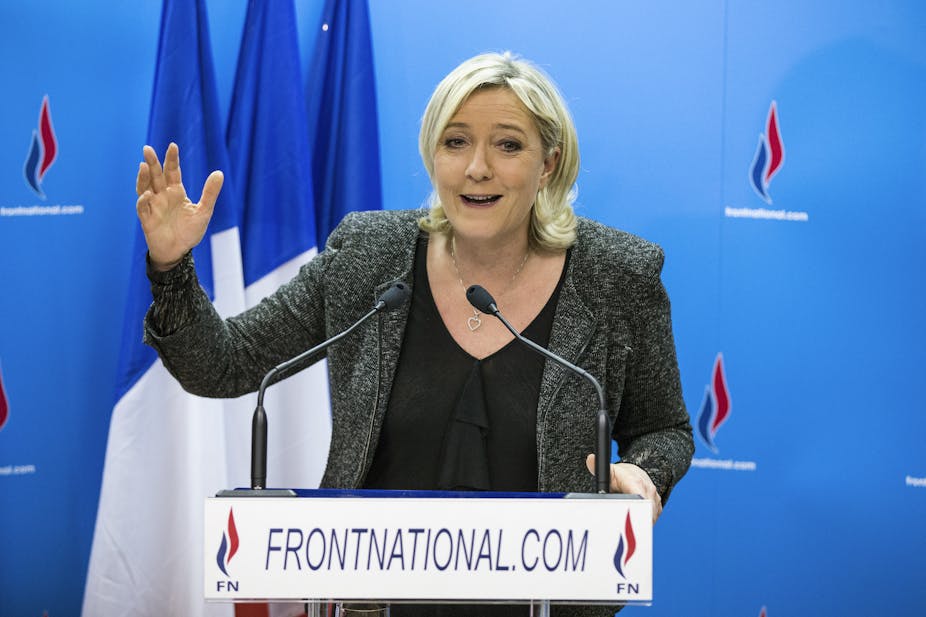Marine Le Pen called the results of last weekend’s French local elections an “earthquake” – co-opting a phrase used about her father’s accession to the second round of the presidential elections in 2002. There is no doubt that the Front National did well in the first round on Sunday, winning in one town in the north and sending up to 229 candidates to the second round next weekend, almost doubling its 1995 record. For Le Pen, Sunday confirmed “the end of the bipolarisation” of French politics: “the French had freed themselves from the obsolete Left/Right choice”.
The reporting of these elections had the FN all over it. For centre-left Libération “the Front National is at the centre of the game”. Right-wing Le Figaro stressed the FN’s breakthrough – Steeve Briois, winner in formerly left-wing Hénin-Beaumont, was a symbol of this “blue Marine” wave. Le Monde ran countless articles analysing this potential “earthquake” while Le Parisien featured a prominent picture of Le Pen’s advisor Florian Philippot. The FN even made the front page of the Wall Street Journal, and many other newspapers across the globe.
The FN has undoubtedly done very well in some towns, but in the current state of high discontentment, the national average of 7% demonstrates the limited appeal of the party, apart from its most prominent figures. Overall, the FN is unlikely to win in more than 10 communes this weekend, far from significant in a country with 36,000 mayors. Yet, for the Nouvel Obs, these elections represent a “new age for the extreme right”, applying the wrong conclusion to an otherwise correct diagnosis.
To explain the FN’s results, journalists rightly highlighted the latest developments of the ongoing political crisis in France: the failure of the left to offer the alternative many wish for and reverse the rise in unemployment; the inability of the moderate right to rebuild itself after Sarkozy’s 2012 defeat; the corruption scandals on both sides of mainstream politics; and of course, the normalisation of the FN’s rhetoric, dramatically accelerated under Sarkozy’s presidency.
Yet, while it achieved 7% nationally, the overall performance of the extreme right party was mixed, and it failed to resonate beyond its traditional heartland in the north and south-east. Such figures, while indeed impressive and a testament to the recent rise of the FN, should therefore prompt more caution that has been seen in the French media since Sunday evening.
There is little doubt that the current political mood in France is fertile ground for parties such as the FN, which capitalise on discontentment through their “neither left nor right strategy”. In contemporary French society, appearing to be against the “establishment”, separated from the decisions made by successive governments and their inability to shake France out of the crisis, is certainly an electoral bonus.
The picture could hardly be gloomier, and yet more favourable for the extreme right. A recent CEVIPOF poll estimated that trust in political parties was at an all-time low 11%, with a massive 87% of respondents declaring that politicians cared little or not at all about “people like them” (up from 81% in 2009). Some 69% believed that democracy in France does not work very well or at all (up from 48%). Playing into the traditional extreme right theme of democracy in crisis, only half of the respondents felt they “have control over their own future” (51%) and a mere 34% felt positive for their future.
In this deeply sceptical environment, and with 60% of respondents declaring they have no faith in either the left or the right to lead the country, there is clearly space for an alternative to emerge. However, in this favourable context for alternative and protest parties alike, the FN has so far failed to make convincing headway into the discontented, with abstention rising even faster than Le Pen’s result.
Yet commentators have, for the most part, failed to resist jumping to hasty and sensationalist conclusions. In the 24-hour news cycle which forces many editors into simple, catchy, and often shocking headlines, what has been downplayed is perhaps the most important factor in the future of French politics. With 38.5%, abstention reached a new record (up 5% from 2008 and 8% from 1995).
Abstention is more than ever the largest “party” in France, far surpassing the FN. Therefore, while the threat of the extreme right party is very real, the solution to the democratic crisis in France, and in many countries in Europe, is not to be found in its exclusionary programme and neo-racist rhetoric. Instead, it demands a careful, deep and likely painful rethinking of our democracies and their current ills.
In this project, the media must reclaim its role as a guarantor of democracy, providing more than just a simplistic and convenient understanding of the news. More importantly, those who have felt abandoned by the system must regain faith in their ability to participate in and craft politics towards more progressive, inclusive aims – something which at present necessitates going beyond the simple act of voting and taking part in grassroots and global movements alike.
In the current situation, and while the public’s contempt for mainstream parties is often warranted, most are aware that the rise of parties like the FN is bad news for everyone. It is time for the voiceless to regain their voices, which have too often been hijacked by the extreme right, pretending to speak on behalf of the “silent majority”. Where such a debate is likely to lead, or whether it is even a possibility, is unknown, but it is part of a process essential to the return of a more positive Europe.
If nothing changes, with much of the media and politicians ignoring abstention and focusing instead on the FN, the extreme right is bound to continue in its process of legitimisation, while the growing discontented will remain unheard.

